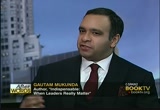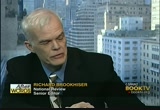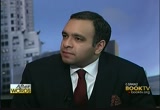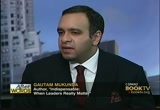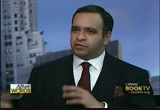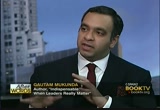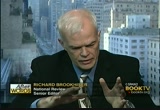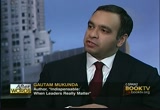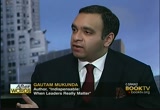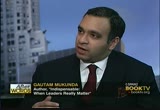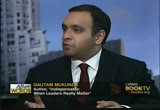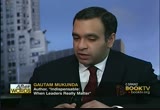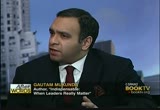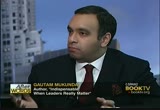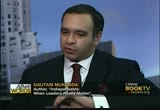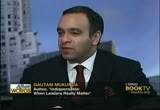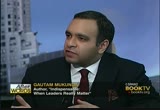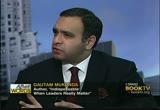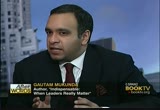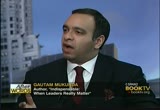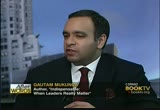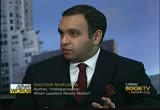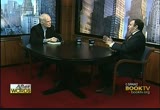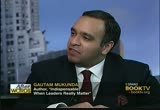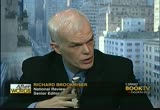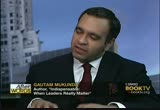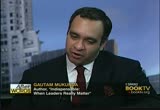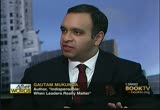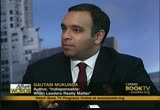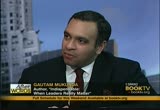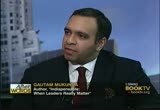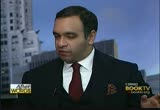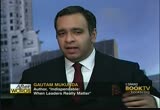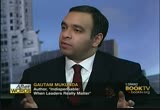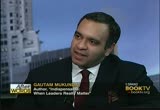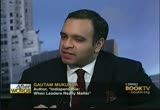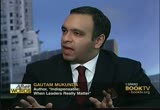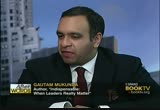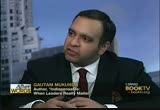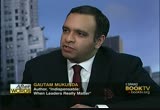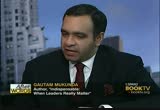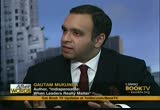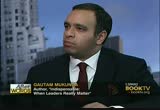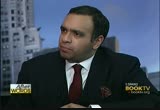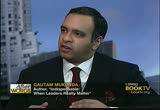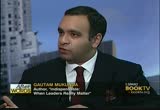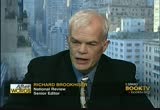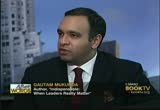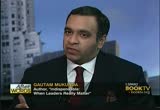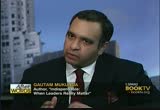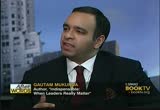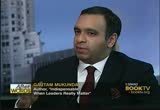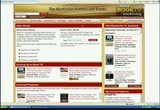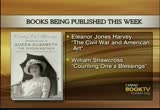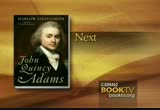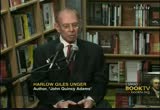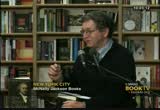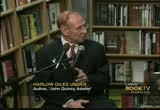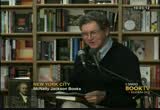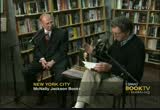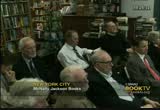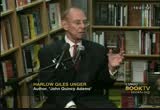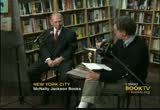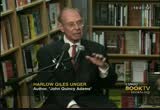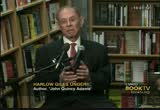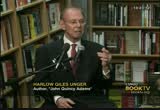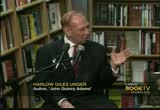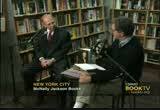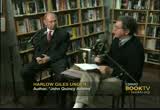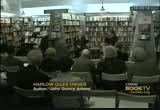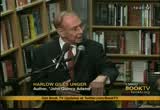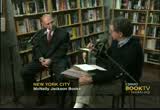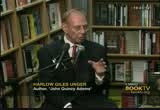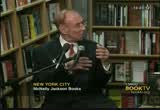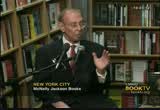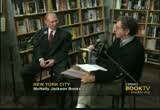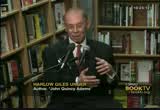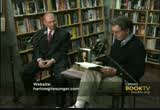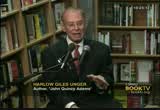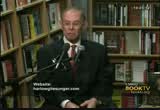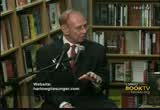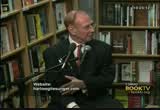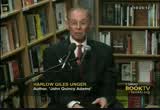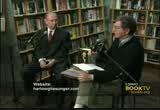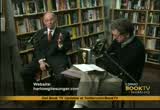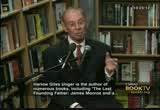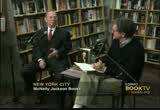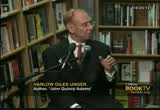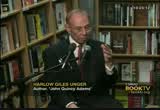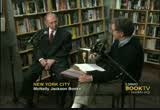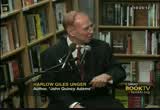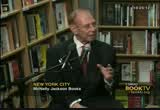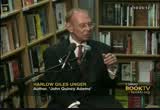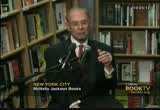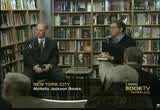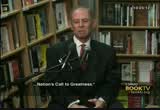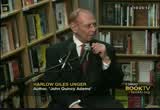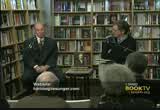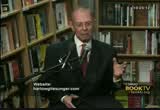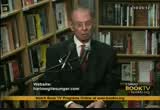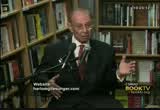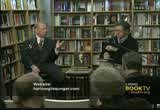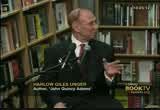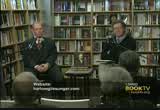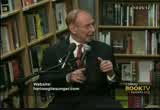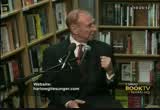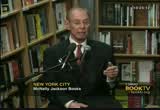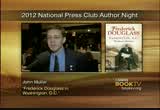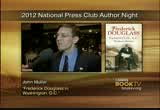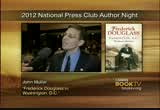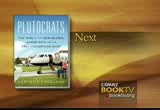tv Book TV After Words CSPAN November 25, 2012 9:00pm-11:00pm EST
9:00 pm
meeting and the major one talk about it ego that the world would end but at the same time there are people in history that fate seems to hinge that events would have been very different. although it is not fashionable there are indispensable individuals but that is a matter of context. their indispensable up that moment, that context, or that time. >> host: you say is a controversial notion with philosophers. just like plato or karl-marx-stadt says that is not the case. tell us how they lock horns.
9:01 pm
9:02 pm
>> it's all about biography. what i thought is these are two further apart view points. the problem is that both arguments make sense. the social scientists or the people following the tradition of, you know, not just marx, but most social scientists say, look, there's three reasons why leaders don't matter that much, that the leader of my organization faces external constraints. if you're the ceo of company, you have competitors. you can't set prices at whatever you want. there's internal constraints, tradition, culture, everything inside a country, company, military unit. you can't do whatever you want. most importantly, leaders are not chosen randomly so most leaders of powerful organizations, organizations that we care about, organizations that have the ability to reshape history, they are not picked out of a hat, but
9:03 pm
picked because that organization is looking for someone with some set of characteristics. >> host: you call that the leadership filtration process? >> guest: that's riergt. every organization has a process. very few, if any, pick people randomly. >> host: including countries? >> guest: countries, companies, and even the sciences, not an org's at all,, -- organizations at all, but there's filtration processes. the most recent presidential election in the united states. there was something, if you went through the republican primaries, that people were saying, well, it's not this person. it's not -- tim drops out after the iowa caucuses and michele bachmann, and newt gingrich, and you're left with a last person standing. most often, it's not about picking a winner, but it's about picking losers. this is not the person. this is not the person, and finally, you get a last person standing. >> host: process of elimination. >> guest: exactly. >> host: which is consistent
9:04 pm
in whatever organization it is? >> guest: so -- >> host: has to be? >> guest: i think it is in the sense that it's a platonic idea, a simp fied # version of reality that i think you use to build theory. start with simple and make them more complex, but if you take, say, ge. so ge is famous for the way it chooses leaders. ge, we always tell students ge is a company that works in practice, but not in theory. it doesn't seem to do anything of the things we say it should do, but it's incredibly profit l and successful. take ge's core competency, it's good at picking leaders. it's good at developing managers, training managers, and picking the right people. ge spends 20 years selecting among all of the people in the organization and slowly promoting them, evaluating them over and over and over again until at the end of the day, say 20 years, no one from outside, you work your way up. at the end of the day, there's five finalists, say, who all, the ceo picks one person from the five finalists.
9:05 pm
think of the five finalists, two things about them. first one is, well, they are all probably very good at their jobs because they made it all the way to the top of ge. they made it all the way to the top of the company that's been successful for 100 years so they are close to what ge is looking for, and there's one thing to be sure ge is looking for which is a good manager. the other thing you have to believe about them for the exact same reasons is that it doesn't matter which one doesn't get to pick. it obviously matters to them, but the per spktive of a ge shareholder, five people made their way to the top. how different could they be? they all passed through a 20-yearlong leader filtration process. >> host: you have a name for leaders who emerge in that way, a class. what is that? >> guest: that's right. i call those leaders modal. many people could become the leader. if you rerun history a million times, you wouldn't get the same person over and over again, but random factors.
9:06 pm
the presidential election in 2000. george w. bush is the president of the united states, at least in part because of the ballot design in florida and the weather in the florida panhandle. there's nothing more random than the weather in florida. if you run history a million times, random events make different people win -- different likely hoods of winning. running that election a million times, you get george w. bush 400,000 times and john mccain 100,000 times. a lot of people. people who are at the center of the distribution, likely to win, people who have been thoroughly evaluated, filtered by the process. another way i describe it is filtered leaders. they are similar. they have a lot in common p each -- a lot in common with each other. if you get power by bypassing the process, something happens so the process is not able to thoroughly evaluate you, and in the process recognize that you are not what it is looking for
9:07 pm
for whatever reason and stop you from gaining power, then those people, i call them unfitterred, can be on the extreme of that distribution of people who might possibly gain power. >> host: so these people are not stopped, even though the deck is stacked against them? >> guest: that's exactly it, yeah. luck counts. random events count, or, sometimes. the deck might not be stacked against them, but the evaluation process can want be triggered. if you inherit control of the company, you're not evaluated, but inherited. the evaluation never kicks in even if people know you'll do a bad job. >> host: right. we have in the leadership filtration process, we have the modal leaders and extreme leaders. >> guest: that's right. >> host: now, you have two sets of leaders that you look at in great detail. one of them is the presidency of the united states. the other ask the prime ministers of great britain since 1832 and the rules changed. let's start with the president.
9:08 pm
why did you pick the presidency as a case study? >> guest: so there were a bunch of reasons. one is importance. i think when you're -- >> host: sells books. >> guest: hope it does. >> host: you recognize these guys. >> guest: right, more than that. i think that part of our job is -- i'm an academic. part of my job as an academic is to answer questions that matter, that really have an impact on the world. we can describe the president of the united states as the most powerful person in the world. i think that's true. it's a fair description. surely, if i can do something to contribute to our understanding of how we pick these people and how we can pick them better, that's a great idea. all by itself, you should -- it's an obligation to look at important issues, issues that matter, but beyond that, the presidency is a perfect test case. one is just data. the american government historically is wonderfully transparent, and carefully chronicle that you can get information, not just about every president, but every person who almost became
9:09 pm
president. you can get the memos written to each other about, well, i think you should do this, no, that, and how they argue about it. i see k okay, if it was not abraham lincoln, who was likely to be president -- >> host: in 1860. >> guest: that's right. i can get an answer that's solid that it would have been seward, who was his secretary of state. that's great. i can go back and look at the memos written to lincoln and lincoln's reply and what they wanted to do and what was actually done. i can get a good proxy for what might have happened if seward got the job rather than lincoln. measure what the impact of lincoln was; right? if you think about individual impact, i don't think it makes sense to say this person was here and the decision was made; therefore, it's about them. if anybody would have made that same decision, it's not about them. japan attacks pearl harbor, december 8th, franklin roosevelt has to decide whether to declare
9:10 pm
were. we were going to. it's not about roosevelt. >> host: no conceivable politician would not have declared war. >> guest: who could have become president. that's exactly right. >> host: okay. so you pay particular attention to three presidents. thomas jefferson, abraham lincoln, and woodrow wilson. let's do them in chronological order. start with overson. is he a modal president or extreme president? >> guest: definitely a modal president. the way to judge that is how thoroughly were they evaluated before they were in power. if anyone who had the ability to influence whether or not they'd get the job, knew everything about them, then they -- those people have the ability to recognize, okay, this person is not what we want or this person is what we want, and so they pick jefferson. look at jefferson's career, he
9:11 pm
had been governor of virginia, ambassador of state, vice president of the united states, member of the continental congress, author of declaration of independence, unlikely nip in history has been evaluated or inspected as closely as jefferson was before he was president of the united states. people looked at him and said this is the person who should be president. >> host: well, his opponents said it's the guy we don't want because it was a close election. >> guest: it was. it was a strange election. >> host: it was a very strange election, but hard fought. he had a lot of enemies, but you're saying, i guess what you're really saying is both the supporters and the opponents knew who nay were talking about. >> guest: partly that. i think so -- especially when parties become ideologically ho mog nows as they were now and then, any democrat is different if any republican or in those days, any democrat different
9:12 pm
than a federalist. if you measure impacts, you shouldn't measure the democrats against the federalists, but the democrat against the democrat who would have been there if that democrat, the first one wouldn't have had the job. >> host: if jefferson was killed, another member of the party would have contested that election. >> guest: right. the other member of the party was james madison, and you want to baseline jefferson is what would madison have done in jefferson's shoes? he was the likely alternative, and he was filtered and likely to be a modal candidate. in the case of 1800, okay, say if the dice rolled differently, maybe john adams gets the presidency, and -- >> host: [inaudible] >> guest: he should take a glance of the adams and too and see what he would have dope, but the important question is jefferson versus madison, what happened there, and so jefferson is incredibly evaluated,
9:13 pm
becomes -- the presidency -- the election for 1800 is exciting, and in some ways, the most exciting election in american history because jefferson -- >> host: god save us from such excitement. >> guest: the idea as burr as president of the united states, random things matter. if he's president of the united states, hard to imagine -- >> host: all bets are off. >> guest: yes. he doesn't. in large part, people realize he's not someone they want near the white house. jefferson becomes president. jefferson is -- the question is how much did it matter? if you look at the jefferson administration, historians are overwhelming on this is the most important event of the jefferson administration was the louisiana purchase. that's not surprising. if you double the size of the country peacefully, at almost no cost, this is an enormous achievement for a president. any president would want that on the resumé. is he a high impact president?
9:14 pm
if jefferson was not there, does the louisiana purchase happen anyway? jefferson sent an em baa stair to france to buy the tear -- territory from france. he sent him to buy the city of new orleans from france. the louisiana territory as a whole was not mentioned by anyone in the united states as even a possibility. that embasary arrives in paris, the master who was already there, robert livingston who was approached, and he says essentially, how would you guys like to buy the entire territory of louisiana. livingston, it's not surprising, he said, yes, let's do this. they negotiate. the embassy arrives, complete the negotiation.
9:15 pm
>> host: that's james monroe. >> guest: who would become madison's secretary of state, and then would become madison's success sore as president. we have in the room a bunch of people almost who -- who would be president or almost president or thoroughly evaluated. they complete the negotiations. they are not difficult. the french want to sell. they have bigger problems than they have with the united states. they want the cash. >> host: louisiana was a white elephant. >> guest: they think that the united states gets louisiana. it's too far away, and they with too consumed to protect it. he says, amazingly, with the foresight that gives him the reputation for, you know, genius of mixed ethical quality, but remarkable intellectual abilities, a says a century from now, it could make them so powerful no one in europe could stand up to him, but he said a century from now is not my problem. of course, he was right. they take the news of the purchase back. it arrived in boston.
9:16 pm
boston is federalist territory, the opposition for the jefferson administration. the opposition that would want to deprive jefferson of the triumphs, and how they signal the opposition to the purchase is set off a fireworks display. it was not a throaferl -- controversial thing. american politicians were enthusiastic about this. news gets to washington, and the senate starts to debate whether the ratification of the treaty, and the only major obstacle to the purchase then arises is that jefferson, himself, strict views of the power of the federal government led him to believe that the federal government did not have the power to acquire territory, and he starts to hem and haw and say what we need is a constitutional amendment to give the government this power. now, napolian in france overthrew his government. he was not likely would be impressed by the argument. he makes noises saying, look, i'll just revoke the treaty. it's not been ratified yet.
9:17 pm
madison, our baseline alternative, comes to jefferson -- >> host: the secretary of state. >> guest: right, in the room for every negotiation. madison comes to jefferson, you can't do this anymore. you have to agree. you have to yield. it's too big an opportunity to let your strict view of the federal government hold sway. he backs down. they go. they make the purchase. that's fine. the way this story goes is jefferson displays skill; right? the negotiation, chose the right person, monroe, absolutely the right person to send to france. gets it through the senate successfully, manages all of these things. he displays skill, and flexibility, but think about -- >> host: flexibility because he's willing to override -- >> guest: yeah, at the end, too big an opportunity to have an obstructionist view of the government stop this. we got to get the land, and they do. skill and flexibility are things on the whole we like in a president, but don't be surprised someone with
9:18 pm
jefferson's record had skill and flex the. if he didn't have that, the process in that long record would have seen it and would have locked him from getting power so the question is not, again, that being a low impact leader is not bad. the easiest way to have an impact is to fail. there's so many more ways to fail than to succeed. most high impact leaders are bad. >> host: so you also make the appointment that not only was jefferson seeing eye-to-eye with livingston and monroe, the guys in paris, and madison, his secretary of state, but major federalists, his enemies, also approved this move. i mean, not all of them, but the majors ones. >> guest: major ones. adams was on record, not publicly, but privately, saying he was in favor of the purchase, and adams, his son, actually broke party ranks to vote in favor of the purchase on several critical votes. hard to imagine him doing that
9:19 pm
without sort of the approval of his father. >> host: right, right. >> guest: as we see, you know, as we see in modern politics, major incentive was to deny jefferson such a victory, and once -- >> host: they like it anyway. >> guest: they like it anyway. >> host: it is an example of jefferson as a modal leader, but everyone else who might have been in his shoes, you're saying, would have done the same thing? >> guest: yeah. >> host: presented with this golden opportunity, they would have grabbed it? >> guest: right. whoever didn't would not have reached the presidency in the first place. >> host: the second president, abraham lincoln. modal or extreme? >> guest: extremely extreme. >> host: why. >> guest: lincoln's as unfitterred as anyone in history. the story of his election is one of excitement and random events it's about impossible to capture. could go on for hours op just this topic, but his record in american politics is brief.
9:20 pm
he has one term in congress in which he's so unpopular, doesn't run for re-election. he was in the state legislature, and he has not been in the state legislature for quite a while before he runs 2341860. ran for the senate twice, defeated both times. he's a national celebrity because of the debates with douglas which he lost and a speech in new york -- >> host: lost the election. >> guest: nobody scored the debates, but at the end of the day, the purpose of those debates was to win the election, and he didn't win the election, and a speech he gave in new york. the way i think about it is we can remember barack obama's speech in 2004, this -- the democratic national convention, a dazzling rhetorical masterpiece making him a national figure, and four years later, was without that speech, he's not a candidate for the presidency. lincoln gives a dazzling speech in new york, the cooper union speech. it is a beautiful testament to the quality of lincoln's minute, the research he does, the
9:21 pm
logical argument. it's a great speech. well worthy of praise, but when he ran for the senate, when barack obama gave a speech in 2004, he was running for the senate in illinois and won. lincoln ran for the senate in illinois, and he lost. did you want to think about lincoln in 1860, think about barack obama running for the presidency in 2008, if he had lost the illinois senate election, not if he had won it. that's the level of national obscurity we are talking about here. the election itself, the republican national committee, votes to put the republican convention in chicago in 1860. lincoln's from illinois, huge hometown advantage for lincoln, but the reason the committee puts that in chicago by one vote, by the way, voted to put it in chicago by a vote, could have been in missouri if one vote switched was because no significant republican candidates were proillinois so it was mutual territory, had not considered him. once -- >> host: were not worried
9:22 pm
about his home court advantage because he was not a player in their mind. >> guest: he was not a player. there were lists published by major newspapers with biographies of the ten major candidates for the republican nomination, and lincoln was not on the list. >> host: so now tell us about the two republican front runners in 1860. >> guest: okay. the two are william henry seward, lincoln's secretary of state, and sam p. chase, governor of ohio. >> host: seward is a senator from new york? >> guest: a two term senator from new york and two term governor of new york. chase a senator in ohio. >> host: new york is the biggest state. >> guest: like california today. seward is the founding father of the republican party. this is only the second presidential election the republican party participated in. seward is the dominant figure in the republican party. it's sort of his -- he is more significant than any two other figures in the party combined. chase, another alternative, is
9:23 pm
the man chiefly responsible for the republican party's power in ohio and, in fact, much of the midwest -- >> host: also a big state. >> guest: even in those days as it is today, and, still, perhaps america's one -- one of america's most famous anti-slavery advocates, a radical abolitionist. he didn't start that way, but at this point he was. seward, not radical on anti-slavery issues was perceived that way because of a series of speeches he gave viewed as inflammatory. lincoln, on the other hand, because he did not have a national record, could convincingly portray himself as the least radical. in those days, the least anti-slavery republican, up for the race. they go it, and seward doesn't just have the advantage of being the dominant republican and being the governor and senator from new york. seward has thor weed -- >> host: great name. best name ever of an american
9:24 pm
political figure. >> guest: marvelous. it's portraying weeds', you know, nature, i guess. the finest political operative in the mid 19th century america has to offer. he goes to the convention. he has essentially infinite financial resources in the days when deals under the table involved cash as well as anything else you can imagine. >> host: that doesn't happen anymore. >> guest: of course not, ever. enormous advantages. he's been to many conventions, dominating most of them. in fact, seward was not in the republican nominee in 1856 because weed, long time ally said there was no way to win. you don't want to be the leader of a losing cause. wait four years when we will win. he read politics exactly right. lincoln's campaign manager, david davis, just to put it in perspective, davis has never been to a republican national convention.
9:25 pm
you have a veteran, the best in the business, against a guy who has never been to the convention, and davis goes in, davis' advantage, the one advantage that weed doesn't even know about, is that he knows lincoln's going to be a player, it's in the midwest, lincoln's hometown, and because of this, he knows that chase is going to have the ohio delegates so the delegates from ohio are going to support chase on the floor of the convention on the first ballot only. in fact, several other states are going to support their candidates on the first ballot, but the first ballot only. what this means is that seward probably can't get a majority of the delegates on the first ballot meaning there's back room dealing, horse trading, negotiating of every conceivable type. so davis goes there and does a few things. >> host: let's wrap this up because we're coming to a break, but just leave this, set the stage, and we'll come back and find out who wins. >>guest: how random american
9:26 pm
politics get, david davis realizes the seating arrangements are going to play a crucial role in determines of nominee for the republicans and therefore the next president of the united states. >> host: okay. we'll be back after a brief break. >> host: okay. we have left ourselves with a chicago convention in 1860. now, we're talking about lincoln as an extreme leader, as an un
9:27 pm
unfitterred leaders, but there's home court advantages. tell us what effect the seating had as the convention plays out. >> guest: so lincoln's team is able to receipt sprouterrers -- recruit supporters from all across illinois. they bring them in chicago on discounted tickets. lincoln was a railroad attorney so they arranged that. they print fake tickets for the convention and stack the hall to the rafters with lincoln supporters. every time lincoln's name is mentioned, supporters yell and scream support so much so that the windows of the hall shake in response. this makes the convention dense. no one can think. davis, lincoln's campaign manager goes to the seating arrangement guys saying i want the new york delegation where weed is seated to be surrounded on all sides by other strong seward states. davis knows the condition will
9:28 pm
be such a zoo they can't hear themselves think or talk to each other at any distance. if weed is like this when the negotiations have to start, he's going to be physically blocked off from getting the states he needs to swing to seward's support. the swing states, the states that could go to anybody, the most important being pennsylvania. pennsylvania -- >> host: also a big state. >> guest: a big state, the state with the ability to put seward over the top or longes -- lincoln in first. the man who controls the pennsylvania delegates, simon cameron, a man that would eventually in the civil war be lincoln's first secretary of war. simon cameron is a man so legendarily corrupt that another member of the lincoln cabinet stated that cameron would steal anything other than a red hot stove. when he demanded an apology and lincoln forced the man to deliver, he apologized saying,
9:29 pm
i'm sorry, you would also steal the stove. so cameron is open to a deal. lincoln sends a message to davis on the telegram, and in those days, candidates do not attend conventions. their managers -- >> host: lincoln is home. >> guest: back in springfield, seward in new york. lincoln sent a telegram. it's make no deals that bind me. he doesn't want corrupt bargains. davis gets the message and says, essentially, lincoln's not here. we'll do whatever we need to do, and he'll back it at the end of the day. davis goes to cameron saying swing to lincoln, and i guarantee you you get a major cabinet position. cameron says okay, makes the deal, and lincoln captures the nomination. >> host: and in effect, this is the election; right? >> guest: yes. at this point, the democratic party split between northern democrats and southern democrats, neither has actually chosen a candidate. it's clear that the democrats
9:30 pm
choose douglas, lincoln's old adversary, but it doesn't matter. the split means republicans win the election. the republicans know they are picking a president at the moment of the greatest crisis in american history. yet, they choose a one-term congressman over a two-term governor and senator with international reputation. >> host: now, you say there are many possible likely consequences from choosing such an extreme person in a situation like that. ..
9:31 pm
is depression actually was. but it's quite probable at least one his depression was a problem he was able to continue on without any modern merkel therapy and become a successful president. in some ways it may have been an advantage. psychologists have a phrase for people who are able to assess their project and in that phrase
9:32 pm
is clinically depressed. we are naturally optimistic this idea of realism and the far more fully depressed, not just so severe they are incapacitated moderately are better able to calculate their success with. wendi endeavors are worth taking chances. >> does it also helped him? >> guest: lincoln's devotee is so deep and profound that i don't think any one source, we can't attribute it to one source to get in than when he was a child, she was noted by other children in the west and the rough-and-tumble in the police as being someone who is unable to see an animal being hurt who stands up for the continual routine basis. i suspect that depression may
9:33 pm
well have led to his empathy but it is so inextricably wound in every part of his character that sort of, it's cool can't be understated. it's almost foundational in our understanding of it. >> host: so lamken when is the election of 1860, and as we all know from reading doris kerns goodwin's book team of rivals he picks his main rival and gets the most important job, secretary of state. now, the model of leaders we were just talking about jefferson, he was modal because he was like anyone else who could have been in his shoes. everyone would have grabbed louisiana but everyone would have made that choice, so lincoln is extreme. what does he do that his peers wouldn't have?
9:34 pm
>> guest: it's filled with things only lincoln could have done. at the end of the day he is a genius. i don't think there is any doubt on that in many different fields. the country is looking like it if it gets at the moment we needed it. but the best way i think to look at this is to look at the very first decisions he makes as president because we don't see these consequences were the small differences at up to big ones in the administration. it is the best possible choice because it is a perfect natural experiment. i know what he did and i can go in and see what he wanted to do because he is telling him what he wants to do. and it is all but the information that he does and he is always part of it. he is in many ways still the dominant republican in the country. and even chicago doesn't have the prominence in new york and philadelphia and he's not even
9:35 pm
from chicago, he's from springfield. and so common in his view he has a pick from nowhere in the white house who's completely incapable of doing the job that he should have and he is completely free telling him you should do what i tell you to do and of course he does this. as of the crisis for the presidency because it starts to evolves around fort sumpter support sumter is besieged by members of the south carolina militia and held by federal troops come in and essentially the crisis comes down to what should we do? since semper is essentially one of the two federal territories in the states, the only one -- so, his position is that the south is bluffing. he doesn't think they are serious about the session but there's been multiples the session in the past and he says the don't need it. they have this fever if we just let them go six months from now
9:36 pm
they are going to come back. it's not a problem here. pull the troops and everything will be fine. then he says everything is and find. it will rally to the flag of the south will come because everybody wants to beat up on the europeans and they will be unified again and he doesn't sort of say this on italy. he tells the ambassadors this is their intention. so the question is what does he want to? and lincoln doesn't think the south is bluffing but he has a problem. the north is not unified behind the war effort. maybe only a third of the northerners want to fight the war. a4a are probably pretty enthusiastic about the secession because we get rid of -- let's get rid of the south we don't have to deal with it anymore. add the nevado third of them are stuck here we don't want to
9:37 pm
fight for it because this is going to be a bad war so lincoln does something very clever. some people in the cabinet want to spend an armed expedition to reinforce sumter. some of them want to sneak the troops in to reinforce and he just wants to give it up. lincoln doesn't do any of those things. he announces publicly that his plan to send them and the expedition is only going to have food, no weapons, no ammunition, just food the lead of the first expedition through the can't come the second expedition but if they don't let through they are firing so they fire and start the war. but just when somebody five
9:38 pm
years on the flag all of these concerns of let them go the fall by the wayside. think of the united states after september 11th or pearl harbor. no one cares anymore. the entire northeast unified behind lincoln in the crusade to unify the country that unity will last but it gives him at least a year or maybe to when he can operate almost unimpeded and launch a war effort without that unity it's impossible to imagine how the north wins the civil war in fact without that unity i'm not sure there even is a civil war i think there is a good chance they go on theirself. if his appropriated to the united states as he should have been. and even in terms of merit and achievement the to term governor or center of the international reputation or someone no one has ever heard of.
9:39 pm
so if he is imprisoned in the united states than they are not united in the more they are split. >> host: abraham lincoln, the odd man out me be on decision which led to the result that we have and he recognizes it it's a memo in which he essentially says you are not doing anything. you should let me. it's quite explicit. lincoln says many things can be done that if something must be done i must do it. that's the phrase. so he's a genius at lots of things it's what you might call personal management he knows he's a patriot so instead of
9:40 pm
leaving this as a feud that could shatter the cabinet in this incredibly skilled politician, he is able to persuade seward and in a few months, he says to his wife and i am incredibly glad that the country has abraham lincoln to lead us through this crisis and he is the best of last. so without that supernatural ability to work with almost anybody not just from a sioux word but with edward stand in the secretary of defense with various generals, again without that it is difficult to see how they prosecute the war because this wasn't a unified society to read this had to be managed constantly and steered in this incredible endeavor. >> host: let's look at the third president who is also on extreme, this is what role willson. does this turnout as happily as abraham lincoln? >> guest: not even close. so, wilson is one of the extremes. he is as on filtered as it is
9:41 pm
possible to get. he is the least experienced in terms of time and politics and the person ever elected president. he has at the time he becomes president the total political experience is about one and a half years as the governor of new jersey so she's in the legislator office, the governor of new jersey becomes president. >> he's written a lot about politics. >> guest: he's like me, a political scientist. i suppose that should make me more favorably disposed to him, but academic research on politics is in the same thing as doing politics, and it's not the same thing because of what you've learned but the value experience so much what experiences that is learning up the learning curve. everybody has a learning curve, but it's not moving you of the learning curve. but the other thing in the time and politics is not just what it gives you, the candidate, the potential leader, not just the
9:42 pm
experience but the evaluation. it gives other people in the arena the chance to look at you when you have power and when you are under pressure and when the cameras are off and see what you like when you are not trying to impress the public and we know the power has effects on people in usually tautological, power changes how people do things so if you want to know what someone is likely to have power you have to give it to them and observe them off for a day or week or month but for years to see what they are like. no one had the chance to do this with what will wilson. >> host: they did at princeton >> guest: he had been president at princeton and people in princeton, does not to be happy experience. many reforms were valuable in the presidency were valuable, wilson created the federal reserve system. but, over time at princeton his presidency essentially collapsed
9:43 pm
because of the consistent alleged the and absolute refusal to negotiate with anyone who disagrees with him over even small things. the problem is the sort of information you need to be a good leader. what do they like in the back room when the lights are off under pressure and that kind of information doesn't flow well. you don't gossip across the company's common you gossip within politics. but how many politicians know very much about what shirley told them? what do they know about what she's really like? on an academic. i know a little bit about the president of harvard but i don't know anything about the president of princeton to read so the present experience and evaluation melhem of historians looking back we can see that tells us a lot about what's going to happen in the presidency but at that time they couldn't do that.
9:44 pm
they didn't have access to that information. and you wouldn't expect them to get out. >> host: you have the great quote from one of the princeton with peers. he grew arrogant and sarcastic and spoke in a way i wouldn't have tolerated from anyone else. he manages to be elected president in 1912, and then another famously complex election because this time the republican party has split and it's almost a mirror image of lincoln. he wins and the democrats are split, wilson wins in 1912 because the republicans have slipped. so tell us about the episode in his administration that you most focus on. >> guest: why focus on the
9:45 pm
treaty of versailles, particularly senate struggle, there are the guys states should ratify the treaty if for high. this is in the second term. this is the treaty that ends the first world war and the treaty does more than end of the war. the treaty is designed to create a postwar settlement. some sort of a world that will be more stable and will not lead to this ever again and we know the field but once the treaty does need to create a league of nations and so this league of nations is willson's grandchild. none of the other major negotiators at this peace conference has any interest in such a league that will send it. he wanted this but it is not purely a product of willson. to give you an example to other people that supported the league theodore roosevelt and william howard taft in the 1912 presidential election the most recent in the united states. so indeed was well within the
9:46 pm
mainstream of american foreign policy. they believe dennett. but he is the negotiator and he gets a part of the treaty and then he comes back to the united states and the senate has to ratify it. eda of them have said that they want the united states to ratify the treaty under some conditions 80 is well more than enough for the ratification. so 64. ratification is and hard in this scenario. uniques 64 come 65. okay. the problem is the senate republicans led by henry cabot lodge who wilson has known for many decades didn't really want to give willson a triumph. some of them are just opposed to joining the treaty. they have reservations out the sovereignty. many of them are willing to join the treaty with conditions they call reservations and these reservations are not huge.
9:47 pm
the british for example will say that they have no problem adding these to the treaty. it's not an obstacle for them. they don't have a big impact -- >> host: so they are not deal breakers. >> guest: they shouldn't be deal breakers. but henry cabot lodge no was willson come and lodge says he might accept reservations of principle but he will never accept reservations that i attach. and wilson in a private meeting is told we can get the ratification easily if you accept. and wilson says i will never accept the reservations of anyone who opposes the nine will crash. that is willson's statement. but he can't crush lodge. so at the reservation and the treaty -- >> host: he's republican. >> guest: that's right he's the republican and the leader of the republican party in the senate, and most influential voice in the party.
9:48 pm
>> host: give a breakdown approximately. >> guest: it is pretty closely split. i believe there is a democratic majority at this point it's not enough to ratify. at this point the key is the 65. that's what he needs. and that you cannot do with just democrats. you have to have republicans. you have to have the watch. he said lyle will vote yes with the reservations attached. and will send has to get the treaty passed to read the reservations. >> host: do you think lodge would have? and yes, on many -- in fact he voted for the treaty when it went up with reservations. as a, what happens is wilson goes out on speaking for the country to try to persuade the country that a sort of a public storm that overwhelmed the republican opposition and on the speech he has a stroke and is incapacitated. he's pretty far in the tour by the time the stroke of him.
9:49 pm
it wasn't generating any public pressure at all so they bring it up for a vote and first they bring it up with no reservations all of the republicans vote no and it doesn't pass. and they bring it up with the launch your reservations. he votes yes, the republicans vote yes and a big chunk of the democrats vote yes and will send a sense to members of the cabinet on to the floor of the senate to personally buttonhole the senators and the leader of the party is ordering you to oppose the treaty and it barely jails by a handful of votes. if anyone else is in the united states this moment in time the treaty passes if wilson had died of the stroke instead of just being crippled, the treaty passes. but willson stopped his own creation with his own baby in the cradle. if you think jefferson was
9:50 pm
flexible, politicians are for flexible. wilson is rigid and a level that goes beyond, it goes beyond normal rigidity and pathological rigidity that crippled him throughout his entire life. if he had been in politics for ten years before he became president everyone would have known he was like that. and he would never have gotten the presidency because they were unable to accept the victory just because you're opponent's name is hershel the attached to it. >> host: you have a wonderful quote from a senator from connecticut. we can always depend on mr. wilson. >> host: only willson could stop that treaty and he did. >> host: there is no term limit in those days so not
9:51 pm
wilson having a stroke would mean he couldn't run the third time but, you know, running his 3 million times if he hadn't had a stroke he could potentially gotten the nomination for the third time and then fought the election on this issue than perhaps he was thinking of doing that. >> guest: he was hoping he would get a third nomination even after the stroke. anyone except for will send and he was never considered so he did want to find an election on it in 1920, but even if he had won it, the break because the two-year cycle because the six year terms he could have defeated enough republican senators to swing the ratification until i believe 1924 we would have run three
9:52 pm
election cycles on the one issue of the treaty. it's inconceivable that he could have done this. people had moved on by them. >> host: so we have gone through the provincial case studies. i urge people to buy this book to see what it says about mevel chamberlain and winston churchill as british prime ministers. and you also talk about some people in business. when you are setting up the extremes, and we talk about the extreme presidents, one coming very good choice we were lucky he got through the process and in your view a very bad choice with liberals and but you say it's hard to know whether you are looking at a good extreme or bad extreme and then you have
9:53 pm
this wonderful -- this looks depressing. what advice do you give the voters who participate in the organization of american politics or board members of companies should they ever look at extremes? when should they run that risk? >> guest: i am not opposed to gambling i just think you should gamble with your eyes open and you should know as we said before most extreme scale if your organization as good if they are not what you're looking for you to believe you were looking for the right people, but so how desperate. you can't go more than bankrupt so an extreme leader, steve jobs for sable might be the one person that can save your company.
9:54 pm
if you are the voters and you think the united states is in crisis and the system has failed and the people that are choosing normally just cannot get us out as they clearly had, you want to gamble. the system isn't working any more. it's time to break. you can't get a worse outcome than total failure, bankruptcy, civil war. so that is one side of things. second there are things you can do if you choose to take the extreme for the corporate leaders for example you simply never have an outside ceo who's also the chairman of the board of directors. >> host: by definition being extreme? >> guest: yes because the information doesn't flow very well from an organization to another. unfiltered are likely to be extreme. some of them won't be but the odds go up a lot when you bring in an unfiltered person. i think the hardest part is so extreme leaders succeed when
9:55 pm
they do what no one else would do and what everyone else tells them not to do and it is the right idea and today fail when they do what no one else would do and it is the wrong idea. so, the successful extreme leaders are the ones who are somehow able to stick to their guns when they are right and change course when they are wrong but everyone always thinks they are wrong. what differentiated them from all of the people i looked at who are successful but i suspect waukee in the sense that they were right but in a different situation they would have been wrong is not that they just had the sort of supreme self-confidence to resist the edifice of everyone else and go ahead when everyone else is telling them they are wrong with the also have the extraordinary
9:56 pm
level required to keep listening to people even as they pushed ahead to acknowledge the possibility that they were wrong in a profound sense not just on the surface sense but to say if i'm wrong what does that mean what is the evidence? how would i change the course if i'm wrong so because no one is right all the time they could change course. these are characteristics intentionally. >> we are wrapping it up here today we just did a presidential election. barack obama was president already so by definition he's been filtered for four years but mitt romney was he extreme or filtered? >> guest: of filtered. one term as governor and in the historical perspective and politics had he won the
9:57 pm
presidency, he would have been second only to wilson and arguably grover cleveland depending on how you look at it in terms of the shortness in the political career before he became president. >> host: thank you. this is a fascinating book. it looks that a lot of stuff that you know what it tells you stuff you don't know. thanks very much. >> guest: thanks very much. our interviewed by journalists, public policy makers, legislators and others familiar with the material. "after words" is a free weekend 10 p.m. on saturday, 12 and 9 p.m. on sunday and 12 a.m. on monday. you can also watch online, go to booktv.org and click on "after words" in the book tv series and
9:58 pm
9:59 pm
and when historian harlow giles unger recounts the life of america's sixth president john quincy adams who died in 1848. quincy adams, the son of the second president john adams had a long political career which included aside from his presidency, ten years as the secretary of state, cementer, congressmen and mentor to become minister to six countries.
10:00 pm
this is a little under an hour. [applause] >> thank you very much. harlow come i will start with a fairly simple question. was there a moment when you said yourself i need to write a biography of john quincy adams? >> yes, indeed, there was. a couple years ago when i ran out of ideas for books on the founding fathers. others have written on washington, jefferson and madison, and i'd written on patrick henry, james monroe, john hancock so i pulled out john f. kennedy's book profiling encourage and they're in chapter 1 was john quincy adams. in chapter 1 but no that was not the reason he was in chapter 1 to read john kennedy himself a war hero had listed these
10:01 pm
characters and the degree of courage. and he placed john quincy adams first among the most courageous senators and congressmen in american history. he wasn't just the sixth president of the united states. he was a congressman as well for 16 years and a senator for four years. most americans don't realize he was a congressman. many don't even know that he was president. specs are you're going to change that. >> yes, he was an enormously courageous congressman. the first congressman to stand up and call for emancipation before lincoln even knew how to spell the word. >> we will get back to a emancipation and the abolition in a moment. a friend of mine who is a lawyer and reads a lot of history said to me the other day he said i've
10:02 pm
read to biographies of john quincy adams so what is new to these? he was one of the most marvelous document in american history. when he was ten years of his father urged him to start chronicling the events in his daily life, and he started and it became an addict and the illiterate and the iris and history, his diary covers all of the events in 90 years, so his diary started at ten covered all of the formative years of american history. in his life he served under george washington and alongside
10:03 pm
abraham lincoln in the house of representatives, so his life span from his public rights started at the dawn of the american revolution and continued at the eve of the civil war. he knew all of the great characters in that period aside from washington and lincoln he knew jefferson, madison, monroe intimately and lamar alexander, frederick the great, charles dickens, he knew them and he speaks about them and writes them and tells about his life in this wonderful guy. but few people have read from beginning to end. >> have you? >> yes, 14,000 pages. >> your booknotes that it's all online. it's [inaudible]
10:04 pm
>> it's much easier, just john adams diaries they will pull right up and you can see every pages there. it's been a gannet hand written >> two volumes have been published in book form but that's all true this but here is a little show and tell of the bad a printing of the penmanship >> he kept up until about three weeks before his death. he died in the house of representatives that 80 years of age. >> to back up for people that were not history majors, said the political theme of the party, federalists and the democrats, republicans and how we think of democrats and republicans but this is a totally different situation.
10:05 pm
>> we don't think of libertarians? >> some do. we will give that equal time. many people here. >> i would hope so. >> explain a little bit of the political situation that john quincy adams went into as he was going into the white house. >> actually the beginning of these political situations began after the revolutionary war and congress had no power to tax or raise troops and was a debating society for leaders in the various states to argue different policies through the streets were almost at war with each other, independent, sovereign nations in effect, and
10:06 pm
the leaders from various states began to realize we need a stronger federal government and so they wrote the constitution. and many americans were opposed in the constitution and they became antifederalists so they were the federal lists and antifederalists bitterly opposed to each other from the very beginning from the signing of the constitution. the antifederalists gradually became known as the republicans and then democrat republicans. so that when john quincy adams was running for office you now have the democrat republicans running against the federalists and he was the last of the federalists. they ran this country from the beginning. washington, adams, he had a they were the people that ran the country had come they were
10:07 pm
really from the elite. the constitutional elite and the state-owned property rights to vote computer gradually universal suffrage came in not involving women, don't get your hopes up too high. it was a white male suffrage but it became you didn't have to be a property owner and that was what pushed the elite out of power. adams, jefferson is, monroe, these great plantation owners and property owners and elite leaders would permit to the growth of the jacksonian democracy as we call it now. >> your book opens with a scene that is worthy of a movie. 1777i believe john quincy adams is 10-years-old and they are on a boat going to england. can you describe that a little
10:08 pm
bit and being chased by -- >> john quincy adams had been a member of the continental congress and was one of the co-authors and signers of the declaration of independence and we were running out of money. the congress couldn't tax the american people but it could borrow money and asked -- and appointed john adams to go to france to try to raise money from the french government to pay for the revolution. and he decided to take his tenure old son john quincy adams with him firstborn son. john quincy adams buy then was a devoted patriot at 7-years-old when his father was in the continental congress. his mother abigail adams heard fire in the distance since she took her boy to the top of the
10:09 pm
health behind when the massachusetts and they could look across and they saw the battle of bunker hill and she took her boy down by the hand and began melting down the family pewter to make musket balls and she told her son at that time you must rikus to the head of your country and if you don't succeed it will be because of your own laziness. you must make a resolution in favor of what virtue come integrity and love of your country and that's how john and abigail adams raised their way from the beginning to be virtuous, honest and to love and serve his country.
10:10 pm
and so when john adams was sent to france, he decided to take his 10-year-old firstborn son with him to be with him, to go together, to grow closer together because they'd been separated, john adams had been in the continental congress and the boy was with abigail and quincy and he wanted to be with his son and have a hand at raising his son but also wanted to expose him to a european education into the world of international affairs, the world of diplomacy. they went to stay with benjamin franklin, and benjamin franklin slash château outside of paris at the time and john quincy went to a french school from benjamin franklin's grandson, and within several months he was speaking french fluently and was a gifted
10:11 pm
child. by the time he was 15 he could speak four languages, he already studied classical latin and greek and he could read and write. he was so gifted in foreign language that when the family friend was appointed the ambassador to the minister to russia, the first minister to russia and he couldn't speak french at the time it was in the language of international diplomacy, it was also the language spoken in the russian court, the russian devotees. francis couldn't speak french. the young john quincy could come in and he asked john adams can they take him with him to st. petersburg as the secretary of the litigation, and at 16 years of age john quincy adams goes up to st. petersburg and spends the year up there. in the wintertime it was too
10:12 pm
cold to venture out, said john quincy adams on his own had this insatiable appetite for learning on his own he read and studied the date volume history name wind by david hume, the six volumes of edward gibbons to fall in the roman empire and adams met's to volume work on the wealth of nations, the great economic work. he kept studying latin and he read all of the poet's and read cicero and read the english poets. he had a sensational appetite for learning and a 69 was still studying kunkel wrigley. i went to yale instead of harvard. ischemic but i take it as a politician especially in our modern sense of the word he may
10:13 pm
have lacked a certain common touch. >> he had no common touch but very few of the leaders did at the time. they were all university graduates who except for george washington, and george washington was one who educated himself. he read more than 6,000 books to read the constitution didn't give liberty to the ordinary man. it turned over to replace the king of the president. it gave the same rights as parliament had the couldn't tax us without our competition, it did the constitution did not provide liberty for the american people for the property of the elite and was white male property elite that ran this country for the first years of
10:14 pm
the nation. >> when does he discuss where slavery came from? >> he believe in justice and he felt this was a great evil but most of the leaders did feel that george washington early on there is no man who more sincerely more than all i want to see them in slavery in this country. they called it the great evil. it's been invented by the english and spanish and french. long before the founding fathers were born when their fathers and grandfathers were alive, there were only about 15 or 20,000
10:15 pm
slaves in this country and the people in virginia petitioned the queen, queen ann. they found slaves of bergen. they couldn't read. there were illiterate and the tobacco farmers needed a skilled hand. the farms for more efficient. slavery was the basis of the english and the spanish and the french economy in the slave trade and a good clean ann rejected these petitions as the king george. by the time the founding fathers came along, she had almost half a million slaves to be where were they going to go? what could you do with them? they were largely unskilled and there were no opportunities in
10:16 pm
the south. one application of rolled into another plantation. there were no villages and towns and cities as there were in the north and in the north people could flee their sleeves and there were opportunities in the manufacturing where they could learn the skills and serve as apprentices. the only opportunity for the work or field hands and then when the cotton gin was invented and came in, that i absorbed all of the slaves and the unskilled labor, and you now have instead of the patrician plantation owners coming you now have these rather cool middle-income people buying property and planting the cotton. prior year to that one most of them were against slavery because the slaves competed with them for jobs but unlike most
10:17 pm
politicians, he cut his political career on the line in the favor of abolition. he went much further. >> he was the first to stand up for emancipation and he led that fight throughout his congressional career which began after his presidency with. he failed to be reelected and brought this up before because he didn't have the common touch. he believed it was beneath the dignity of a presidential candidate to go out in the countryside and make promises to the people that he knew he couldn't keep. the candidates today don't do that. they set an example for him, but his pledge was to do what was best for the country. the people didn't re-elect him. he went into the congress and he started fighting for justice
10:18 pm
always voting, never voting for either political party. he became an independent, rejected both parties and started fighting for justice for the entire country. he was a gifted lawyer, one of the great in american history with and setting the cases before the supreme court including the one that freed 46 captives aboard the slave ship anthony hopkins played the role of john quincy adams but to make it clear in that role how important the case this was because because his argument put a whole new complexion, legal complexion on the trade. it made the slave trade illegal because his argument was that these africans were freed men who had been kidnapped and
10:19 pm
simply rose up in self-defense to kill their kidnappers so now the slave trade was no longer a slave trade, it was a kidnapping ring and therefore it was an illegal. if you make slavery illegal it made the slave trade illegal and it was the first step in our movement toward emancipation, and the people began rallying around him as the southerners in the house of representatives tried to shut him up as he pleaded for emancipation that aroused the northerners and the quakers at first to realize john quincy adams was a devout christian and said this goes against all of the fundamentals of christianity. patrick henry said the same thing. soon you have an abolition movement that began to grow and
10:20 pm
grow and grow by the more they tried to silence john quincy adams the more he spoke out they passed a gag rule making it more against the rules of the house to use the word slavery and any time he tried to use of the speaker of the house was from tennessee and they would shout him down saying order, order so he started pulling out these petitions from his constituents from all over the country because the citizens in the constitution have the right to petition congress from the agreement says. i'm not using this time simply reading it from the petitions. >> wouldn't you love to have
10:21 pm
c-span around? i believe you write the origin of the term gag rule came about because of adams. he also had a friendship with jefferson who was a slave owner and more than that, how did that work? >> it didn't work well at all. it started out of course when he was very young in paris jefferson had lost one of his daughters and his wife and women jefferson got to paris as our ambassador, he was really forlorn and quite lonely and he started hanging out at the john adams house or john adams apartment and franklin's house, and john quincy was a youngster who and he started taking him to museums and concert and the opera and john adams later rode
10:22 pm
they had this wonderful correspondence between the two of them and they recalled their days in paris and john adams wrote to thomas jefferson john quincy had become more of a son to you than to me so that is how close he was to jefferson as a boy. but then later on of course he comes to power and he begins usurping power and this went against the grain as far as he was concerned he was a strict constitutionalist and believed in the letter of the constitution jefferson pretended to. he was in the rights of the declaration of independence all men are created equal it's the revolution that goes on to monticello and doesn't fire a shot in the war and goes home to monticello and watches them from the plantation. >> more than that --
10:23 pm
>> so they fell out later on in their public lives. later when jefferson and john adams retired they began corresponding with each other and they formed a warm friendship but john quincy adams never -- he voted for jefferson, he was the first to -- the only federalist to vote for jefferson's louisiana purchase when john quincy adams was the senator but then turned around and fought jefferson's attempt to impeach and remove samuel chase from the supreme court. samuel chase was a strong federalist and jefferson was intent on getting control of the entire government. he was a republican and he now had a republican majority in the house of representatives, a
10:24 pm
slight majority in the senate. he wanted to remove the federalist from the bench of the supreme court to get republicans on that and get control of the entire government, and the republicans in the house impeach him, he went to trial in the senate, and when the arguments were finished, the first one to vote was john quincy adams coming and he voted not guilty and that set off the flight of not guilty even as many of them voted not guilty so as the rejection of jefferson's attempt to define -- redefined political dissent as a high crime and mr. meter -- misdemeanor. >> going back to 1824 and 1828, if you didn't go around giving speeches and what they did today, what did he do? >> he believed that the american people should have a good common
10:25 pm
sense to judge a man on the basis of his talent and his accomplishments and he was wrong. he didn't have a good sense, and he actually did not win the most votes in the first election. andrew jackson won more popular votes than he did but jefferson didn't have a majority in congress. so, they -- the presidential race was thrown into the house of representatives and the probability of john quincy adams despised jackson and was terrified of the possibility of the presidency he said jefferson was a barbarian who could hardly run his name and so he got together with henry clay who had the votes in the presidential election and promised him to be the secretary of state and they
10:26 pm
pull their votes together in the house of representatives and that's how he was elected to the presidency. in the next election by then, jackson had gone around the country dillinger popular maturities and getting along changed from state to state to state and which providing for the universal right male suffrage which took the votes out of the hands of property owners and gave it to the barbarians as john quincy adams might say. >> john quincy adams deal with clay and 1824 was that ethical by the standards of those days retrospectively by our standards? >> is certainly was in those days. he took on a flat board. the choice in his mind was to turn the country over to a barbarian who couldn't write his
10:27 pm
name who had violated the constitution act will during a the war of 1812 had gone into the seminal doing whenever he felt like doing. he did not want to see this man president. >> you describe him in the book as a bit of a grouch. do you think that you would like him as a person? >> yes. [laughter] >> is there some time travel involved? >> all of us all grouches at times. he didn't suffer what so he would be grouchy. i was grouchy last night when mitt romney said we have fewer ships today than we had in 1917. >> grout gyn obama said
10:28 pm
something just as stupid. john quincy adams so fabulously learned man who had studied history. the reason for the monroe doctrine in south america the various countries were beginning to rebel against the spanish king, and the french king was a cousin of the spanish king and the french were going to send the military aid to help put out these rebellions and there were granted to the french from going into south america. and they invited the americans to join them in keeping the french out of south america because obviously south america was rich with the gold and silver and john quincy adams was the secretary of state and said absolutely not. we are not going to get involved in the foreign war.
10:29 pm
we are not going to let them come over here either. the seeds are planted from the issuing of the monroe doctrine today if it was a part of murowa's manual message and he had asked his cabinet for help in putting together some sort of a statement making our international policy clear and john quincy adams wrote the core provision of that. there were three long paragraphs that are called the monroe doctrine, and in one of them he tells the europeans we didn't want to get involved in the war we don't want anything to do if you use a lot of our affairs and any infringements in the end of the colonial era you can no longer consider the americas as fodder for your colonial aspirations would no longer be a
10:30 pm
threat to the united states. >> your book mentions family troubles, the kind of things the tabloids would seize upon. the family despite the great accomplishments had some serious drinking problems. >> this is not a problem it was a genetic trait and in those days is very clear that alcoholism was genetic because it didn't have any psychotherapy or any kind of treatment available. the gene was passed along through abigail's family, she was born abigail smith and her brother died of alcoholism. >> he mentioned one line of. do we know much about him? >> he abandoned his family, right? he disappeared? >> he died of alcoholism.
10:31 pm
you died very early but of some accident because you were out of control or of sclerosis of the liver or brain damage or alcoholism. john quincy adams two brothers died of a alcoholism and two of john quincy adams three sons died of dhaka was some from his firstborn george washington adams died in his late 20s and as a young boy charles also died of it and one of the three songs survived as did several of the grandson's but this was a genetic trait in the smith family. just as in the quincy family, the genius which went back to 1066 and the crossing of the battle of hastings by all will
10:32 pm
dillinger town in normandy that still looks this and the english obviously corrected -- corrupted he was a baron running mate in 2015 that forced king john to sign the magna tara so this ran through the currency as well as alcoholism and for the smith family. >> i have a few more questions and then we will open it up to the audience. this is that time travel question that you could interview john quincy adams and we have time for one question, what might it be?
10:33 pm
>> if i had one question to ask him i would ask are you talking about today's society or his society? >> either way. you could go back or bring him here i guess. >> maybe you should go back. islamic if we went back i would ask him why he didn't try harder to remain president of the united states and get him under his control. he was so brilliant as a congressman and as a senator has the secretary of state. it was truly one of the geniuses in the early american political society, and we could have used his leadership as a president, and i think we might well. he thought the civil war was inevitable that that was an experience in the house of representatives. i think that if he had been
10:34 pm
president he might have been able to with have averted the civil war and brought an end to slavery in another way. >> how would he have done that? >> he had the ear of the moderate federalists. as extremists in both political parties they were separatists among the federalists who wanted in new england and new york to secede from the union and let the south do whatever it wants to do. that would have been a vitriol. by then 500,000 sleeves with no hope for freedom. when he i think that would have come to the extremists down but he had the ear of of the moderate federalists like those on the supreme court essentially john marshall who was also firm
10:35 pm
virginia he opposed slavery and wanted to work to end slavery. monroe wanted to work to end slavery. patrick henry who is an antifederalist republican to the left wanted to work and was working with the leaders to try to find some solution to the problem. so i think with so many he could have united the people of good will to address this problem and that polarized the nation and was the beginning of polarization that would never end until a civil war. >> if we could bring john quincy adams to the day, what do you think he would like and not like
10:36 pm
america in 2012? >> he would despise our involvement overseas. our attempt to dictate to society's the kind of society as they have to have. when he had the opportunity as the secretary of state to intervene, monroe would have done whatever he could in the pro-democracy movement so to speak he pointed out that these people have no history of self-government. religiously or politically they had never been exposed to self-government. their political culture and family culture did not tolerate. he said this is a lost cause we must not involve ourselves and said he would not involve us in trying to change the culture of
10:37 pm
the people in the middle east. these are people with no history, no political history or religious history of self governance. they don't know what it means. >> and what would he like? >> i'm not sure what he would like. >> even federalists would be appalled and that degree of the federal government intrusion in our lives today. the federal government in every area of our lives living in garages and roads and highways every where the federal government is in our lives and i would recall the most extreme federalist who founded this type of government. patrick henry would have gone
10:38 pm
along to tear up the map from the mattress. >> we will entertain questions after the audience and may i urge you an homage to brian lamb, the founder of c-span who to me asks the best kind of questions which are simple and direct we can emulate him tonight that would be good. to be have questioned? go ahead. >> the suggestion that abigail has for her children which was virtue and loyalty to the country i think to be a disconnect integrity and loved for the country. >> was that virtue? >> it was in the sense of service to your society. the parting words to his heirs,
10:39 pm
john quincy adams before he died. he knew that his one surviving son was already becoming accomplished and would later become a candidate for vice president and he knew his grandson henry adams was a brilliant writer who later became a distinguished historian. he left this and said you must have one important published in life to use your talents and knowledge for the benefit of your country and for the use of mankind and more than any other family of any other founding father had continued to serve the country generation after generation after generation the given us some jurists, historians, scholars, all types,
10:40 pm
wonderful attorneys. i met two young men, probably not young anymore, this is ten or 15 years ago. one night we got talking to each other. i didn't know who they were and we introduced to each other and the one -- they were both attorneys. one was sam adams and the other was john adams. sam adams that was a direct descendant and john adams was a direct descendant of john adams. >> they stayed out of the news which is public good -- probably good. is there a place people can go? >> there's a national park, the john adams national park or of a lifelong homes of the generations, and i think the gender generation kept them up for a while they all drifted
10:41 pm
into the city's. both of the original home where john adams was born and then a second small home were john quincy adams was born are open to visitors and a large home that john adams built later on in his life and his retirement with abigail that too was there and beautifully furnished to read everybody talks about the founding fathers and they forget to talk about the founding mothers. martha washington was at valley forge, and abigail adams, as i said, took young john quincy up to the top of the hill to watch the battle and then worked hard to help the cause while her husband was in philadelphia.
10:42 pm
this might kill was of little about john quincy adams. >> movies adams was born louisa johnson. her father was in the american consul when london when the two of them met. she was born in london but her parents are american and they were brilliant brilliantly educated. she had an education at home but she could read latin and greek and was well versed in the history of literature so they fell in love and had a long war marriage of more than 50 years. they had their ups and downs as most families to and they had more than their fair share of tragedies. she was subject to many
10:43 pm
miscarriages. they lost a little girl when she was just a-year-old. she got dysentery in st. petersburg russia and two of the three boys died of alcoholism and survived charles francis and gave them some grand children so they doted over the grand children for quite awhile but most of the time they were very, very happy. you mentioned he was a grouch and occasionally he was. i really can't explain it. if you ask them what happened, in berlin the suffered a miscarriage and he was quite pale and the empress sector try putting on some will rouge.
10:44 pm
will she came downstairs with rouge on her face and john quincy brad her, put it on his lap and rubbed off. so they had spats from time to time and one time when they separated, not a legal separation but john quincy adams couldn't afford -- she was a senator to the summer in quincy and winter in philadelphia to go back and forth and back and forth all the time so one of them had to stay put. she decided to stay put in washington with the children so she could be near her mother and brothers and sisters. he went to quincy and was freezing cold one night and he wrote her a letter saying i know i can live without you, but on
10:45 pm
this cold february night, i would much prefer to live with you. [laughter] >> the love letters to -- >> other questions. >> i wonder if you can talk about the relationship between john quincy adams and his father, what particular focus one is the relationship with the parties because i have a motion after he got elected they could have stated it more and more and meanwhile, the this guy basically a republican, right? so his father wasn't getting along well. >> his father left office after one term and was no longer in office and was out of the
10:46 pm
political picture entirely. he had nothing more to do. hamilton had destroyed his political career with the election of jefferson said that in did john adams but john adams and john quincy adams were very, very close, very warm and relationship from early on in their childhood when john quincy was only ten but the road constantly. we are talking about father and son. the road constantly to each other. john adams was always there for his son and vice versa, so a very warm relationship between the two come and john adams, john quincy's wife, the from the very warm relationship and they wrote to each other for years until john adams death in 1826 kc-x [inaudible] becoming the secretary of state?
10:47 pm
>> by then the world had changed and he was proud of his son. he was quite an old man really done iain when his son was elected president and no, he was terribly proud of his son. by then in the jefferson era many things proved wrong. he tried to keep us out of the french and english conflict and poses an embargo on all of a foreign trade. suddenly america was shut down. he added in his head that america's were self-sufficient and we don't need to be involved in the foreign trade. he put the coastal cities out of business, the merchant bankers saw this business, the shipbuilding industry out of business, the merchant marine out of business.
10:48 pm
so by then jefferson had his own course and john adams was really out of it. >> [inaudible] >> his son was a senator and first voted for the embargo and then voted against it and did talk jefferson out of it with a new policy whereby we would treat -- we wouldn't trade with either france or britain until they stopped attacking our ships but we would trade with the rest of the world, and that reopened the trade route. >> i found it interesting that back then the secretary of state was a sort of stepping stone for the presidency which hasn't happened for a long time. >> the secretary of state has more responsibility, far wider than they are today. remember the indians were considered foreign nations. so that fell under the state
10:49 pm
department. everything that would now fall under the department of interior fell under the state department. the state department's role was far broader than it is today and he really ran the country when monroe in his last days he was running the country. madison was doing the same thing and monroe was doing the same thing in the last days of madison and it really was a stepping stone to read he was the most visible most powerful member of the cabinet's and that is what caused such a big factor because hamilton challenged jefferson and he was the secretary of treasury and jefferson was slow getting back from france, so hamilton took over many of the duties for a few months until jefferson got here and he didn't want to
10:50 pm
relinquish them. he liked the power. >> other questions? go ahead. >> hell young were you when you recognized that you had an extraordinary aptitude to immerse yourself in your subjects and their society? [laughter] >> i think it's just this morning when you called me up. i'm not sure that i answered your question. i've been a journalist all my life and writing what i read today is more of an extension of journalism. i don't really bright these books. i let the characters speak for themselves and i feel as if i am interviewing them and i let them tell their own stories. >> at 9-years-old to could do
10:51 pm
that? >> i played with my rubber ducky. [laughter] >> can i ask what you are doing next? >> i'm writing on the development of the supreme court in john marshall and how he salvaged the supreme court from jefferson. it's really the story of what happened around the year 1800 which was a year of turmoil in this country where everybody, all of these primary characters -- george washington had just died and for the first time without a father of the country. all of these men who had been secondary characters they were all heroes in the revolutionary war. alexander hamilton, james monroe, they all loved this country and they fought and bled for it but they were all
10:52 pm
ambitious men and their ambitions came to the floor in the year 1800 more than any other time and they collided with each other. hamilton, monroe, jefferson, all of them collided in the year 1800 john marshall also a hero of the revolutionary war as a chief justice that had been emasculated and told them. >> do you get into the greatest generation which if you had to name one what would it be? >> some people argue the founding fathers were in the generation despite. >> i would think certainly the greatest generation in terms of love of the country. one -- when you heard not just this generation of the founding fathers but when you heard eisenhower speak for example,
10:53 pm
you knew he loved his country. john kennedy, you knew he loved his country. i think that [inaudible] the columns in the the date. for them to say they love this country. >> to me talking about the founding fathers, these are people that could have easily been hung. estimate the all committed treason. they were british subjects and they sought to overthrow the war of the british king and parliament, not at first, only weeks before they signed the declaration of independence they appealed to the king to give the parliament of their back and they said we want to continue
10:54 pm
the rule of the british king and he smiled and rejected it. >> any other questions? >> on that note we will end and let giles sign some books and let's think our author for writing the book and making this possible. we look forward to this. >> thank you very much. thank you. [applause] >> for more information, visit the authors web site, harlowgilesunger.com. booktv is the national press club author might here with john miller his book out on frederick douglass the line of anacostia. you focused on the last years of his life. why is that? >> frederick douglass people know him as the state's income advocate for women's rights. but he was so much more than
10:55 pm
that. his last 25 years he spent in washington, d.c., he moved here in the late -- in the early 1870's in washington at that time that frederick had governed positions and they were well respected in washington, and washington really was a place to be with the reconstruction. you had the first class of the black congressman, black senators coming and they were very prominent. but frederick douglass was the most prominent black man in washington and there was a call or a newspaper frederick douglass was in the north star and kind it was a leader of the black press. they wanted him to help found the speaker and also to help finance it. douglas was very reluctant, but eventually he came around in on generate 13 come 1870 the new era was launched and that was kind of brought in focus on frederick douglass in washington. he got them involved in local politics at the time and was known as the modern republican
10:56 pm
party a little different than the republican party of the 19th century frederick douglass was a very much republican party man. washington, d.c. got self-government in the early 1870's. there were the first nonvoting delegate to congress. frederick douglass actually competed in that position so he was very involved in the local politics. we then continue to run the newspaper and at one point he was the president freedman's bank for a short period of time. then he moved his family here. he really was a man of washington, this is just there's been many biographies written about frederick douglass and we know when we learn about him in grade school in 1845 he wrote his autobiography and told about his life experiences in order
10:57 pm
and his later life has been ignored spending a lot of time in washington as anacostia what has been written about his later life. estimate the hamas called cedar hills. is it still here? >> actually to read in the early 1970's frederick douglass site opened and the flagship side of the national park service has over 40 or 50,000 visitors every year. its high of on the hill and the u.s. capitol dome for the right it is really an amazing majestic view and it's open seven days a week, and the curator of the douglas contributed forward and
10:58 pm
this was important to me, too to make this book not just kind of -- to make active living histories of people that read the book if they've never been to the douglass house would say i want to go over there or if they haven't been there for a few years they can go back over and kind of revisit. >> he is the curator of the douglass house. >> he was the curator for many, many years. a very well-respected kind of a douglass community, and then dr. clifford who was the university archivist at the house contributed the foreword. john muller is the author of frederick douglass and washington, d.c. the line of anacostia. thank you very hatch. >> thank you. >> talks about the rise of the super rich the top .1% of the global population. and the impact they have in the world. the stock was hosted by politics
10:59 pm
and prose bookstore in washington, d.c. and it is about an hour. [applause] >> sorry to keep everyone waiting to read you will have a chance to read my book in that time. i probably don't need to say anything about it. so, i would just say a few things about what's in my book and then maybe we can talk about it. as i have been doing some interviews with my book, i will favor the way of interviewers to get into the conversation is to say the rich have always been with us after all. and actually, that isn't true. one of the points, the starting point is to say actually things are different now. and we really need to
164 Views
IN COLLECTIONS
CSPAN2 Television Archive
Television Archive  Television Archive News Search Service
Television Archive News Search Service 
Uploaded by TV Archive on

 Live Music Archive
Live Music Archive Librivox Free Audio
Librivox Free Audio Metropolitan Museum
Metropolitan Museum Cleveland Museum of Art
Cleveland Museum of Art Internet Arcade
Internet Arcade Console Living Room
Console Living Room Books to Borrow
Books to Borrow Open Library
Open Library TV News
TV News Understanding 9/11
Understanding 9/11